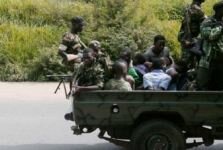BUJUMBURA, Burundi — Bodies keep turning up in Burundi, dumped at roadsides and in streams. Mass arrests are being carried out.
The killings and arrests have triggered fear and uncertainty across this central African country that was already shaken from protests and a coup attempt earlier this year.
It appears no one is safe from a growing state of anarchy.
Ordinary life in many parts of Burundi is now punctuated by gunfire, grenade explosions and assassination attempts on prominent figures opposed to or allied with President Pierre Nkurunziza, who recently sought — and ultimately won — a controversial third term in office.
Amid reports that a rebel group is being formed, the government has been searching volatile neighborhoods of the capital, Bujumbura, with the attempt to take weapons out of civilian hands fueling the fear many here already have of security forces.
A rebel movement is apparently being formed against Nkurunziza by military officers loyal to the generals who led a failed coup in May. The deputy commander of an elite infantry unit, Maj. Emmanuel Ndayikeza, failed to show up at work on Monday, sparking speculation he had gone over. Then on Tuesday, Lt. Col. Edouard Nshimirimana was reported missing with more than 100 Motorola radios and three computers.
Military spokesman Col. Gaspard Baratuza said the officers will only be considered deserters if they don’t return to work after eight days, but their absence is fueling talk of a divided military.
“There is definitely an anti-Nkurunziza armed group that has been formed already,” said Carina Terstakian, who researches Burundi for Human Rights Watch.
“Those people have been hanging out in Rwanda for several months now,” she said. “We believe it is happening.”
Rwanda’s justice minister, Johnston Busingye, said he was aware of the allegations but gave no comment.
Valentin Vyabagabo, a resident of the Kinyankonge neighborhood in the north of Bujumbura, said he saw bodies floating on the Nyabagere River through September. One of the victims was later identified as a bus driver in the Bujumbura neighborhood of Musaga, an opposition stronghold where, at the height of street protests earlier this year against the president, residents erected barricades of burning tires and pelted the police with stones.
“We think these people were killed elsewhere and then the killers brought the bodies here,” Vyabagabo said.
The U.N.’s top human rights official said Monday there has been an alarming upsurge in arrests, detentions and killings in Burundi since the beginning of September, with bodies found almost daily on some Bujumbura streets.
In many cases, the victims appear to have been killed by a bullet fired at close range, United Nations High Commissioner for Human Rights Zeid Ra’ad Al Hussein said, citing reports that suggest many of the victims were arrested beforehand by the police or the National Intelligence Agency.
“We have seen an intensification of search operations allegedly aimed at seizing illegal weapons, in specific neighborhoods of Bujumbura and in other parts of the country,” he said in a statement.
Although the current violence is political, Burundi has a history of deadly conflicts in which the country’s Hutu and Tutsi ethnic groups targeted each other. Nkurunziza took power in 2005 near the end of a civil war in which an estimated 300,000 people were killed between 1993 and 2006.





